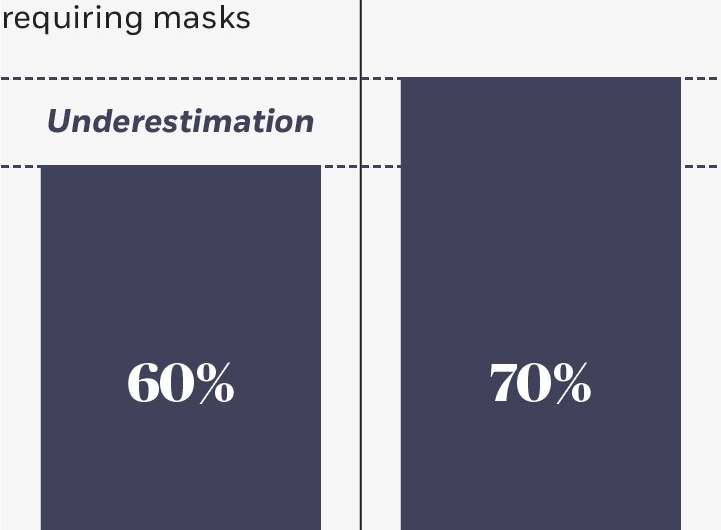Credit: AI-generated image (disclaimer)
To slow the spread of COVID-19 for the past year, public health experts have urged people to wear masks and practice social distancing. But in the United States, many people have ignored those recommendations, and some businesses haven't enforced them for fear of public backlash.
However, most Americans across the political spectrum prefer businesses that enforce mask wearing and would pay extra to be in such an environment, according to new research from the University of Chicago's Booth School of Business.
In a recent working paper, Prof. Oleg Urminsky and research professional Abigail Bergman, AM'19, examine a series of experiments they conducted with thousands of participants. Their results suggest that consumers and business managers have tended to underestimate other people's desire for stricter public health measures.
"Businesses face a risk that they will give in to a vocal minority who oppose masks," said Urminsky, an expert in consumer decision-making, "and not notice that they are losing the trust and patronage of the majority of consumers who prefer shopping in an environment that enforces mask wearing."
In one experiment, 77% of participants expressed a preference for using a hospital that required employee vaccinations over one that only recommended them.
However, in that and other experiments, participants underestimated how many other people would have the same preference, a dichotomy that has implications for public health. For example, the more the participants underestimated support for requiring vaccination, the less likely they were to say they would warn away a friend who was considering getting medical care at a hospital without a strict vaccination policy.
"When the majority of people prefer a policy, failure to recognize that the majority do in fact favor that policy can impede adoption of the policy as a norm, particularly when decision-making is decentralized," the researchers wrote. These belief-based dynamics "may become increasingly important in the context of vaccination policies, as COVID-19 vaccines become more widely available."
In another experiment, conducted in August 2020, the team asked participants on a national panel whether they would prefer to fly on an airline that required masks or one that merely recommended them. Ticket prices varied across 11 questions, ranging from cheaper prices for the masks-optional airline and more expensive prices for the masks-required airline to the opposite.
Study participants were 10 points off in their prediction of how many would prefer a ticket on an airline that required mask-wearing over an equally priced ticket on an another that only recommended masks. Credit: University of Chicago
Participants were also asked to guess how many of 100 other people would choose Airline A versus Airline B when both priced their tickets at $100. Some 70% selected the mask-requiring airline when both tickets were the same price. When the prices varied, participants still chose the mask-requiring airline in the majority of the choice pairs, which the researchers calculated showed a willingness to pay $27 more, on average, for the airline with the stricter policy.
Participants were consistently wrong about the preferences of others: Of those who preferred the stricter policy, 53% underestimated others' preference for the same thing, while 86% of those preferring the lax policy underestimated others' preference for the stricter option.
A second set of experiments indicates similar trends across other types of businesses, including bakeries, pharmacies, movie theaters, hair salons and gyms. The researchers added questions about customers' perceptions of businesses with stricter policies and found that people rated these businesses as more caring, warmer, more competent and more trusted.
A sample of managers also significantly underestimated consumer preference for the stricter policy across business types. This was true even though 88% of the managers personally said everyone should wear a face mask indoors, and 63% "strongly supported" a national mask mandate.
The discrepancy between their personal feelings and what they perceived as the feelings of others suggests managers may not be executing their own views, according to the researchers. That is, those business managers too often underestimate how many customers will agree with—and even prefer—stricter masking policies.
Some of the experiments did produce results where political partisanship was evident, with Democrats expressing stronger preferences for stricter policies. However, the degree of partisan preference in favor of strict policies varied by scenario, and the researchers concluded that the tendency to underestimate how many other people shared their views was primarily nonpartisan.
For example, in the experiment that queried participants about whether they'd prefer a hospital with vaccinated employees, "political affiliation and demographics did not significantly predict choice of the vaccine-required hospital, predictions, prediction errors or likelihood of warning a friend," the researchers wrote.
The consistency of the findings across conditions suggests that businesses may want to rethink—and beef up—their policies. As some states, such as Texas, end mask requirements without the full support of public health experts, many businesses must again decide whether to maintain their own stricter standards.
"Organizations put in the unfamiliar position of making their own public health policy decisions are likely to overestimate the risks to consumer perceptions and their bottom line of setting and enforcing strict policies and underestimate the higher risk they face from customer complaints about failing to have or enforce strict policies," the researchers wrote.
More information: Oleg Urminsky et al. The Masked Majority: Underprediction Of Widespread Support For Covid-19 Safety Policies. (2021). DOI: 10.31234/osf.io/fhdkv
Provided by University of Chicago

























